Data Breach Exposure at Qantas: Exploring Weaknesses in Aviation Cybersecurity
The recent cybersecurity breach at Qantas, affecting 5.7 million customers, has underscored the need for airlines to fortify their defenses against increasingly sophisticated threats. This incident has prompted a pivotal moment of reflection and action within the aviation sector, urging all stakeholders to prioritize cybersecurity as a fundamental aspect of their operational strategies.
The Qantas breach, which occurred through a third-party call center platform, highlights the importance of enhanced third-party and vendor security. Aviation companies should rigorously assess and continuously monitor the cybersecurity posture of all vendors and partners. This includes strict vetting, requiring compliance with cybersecurity standards, conducting regular audits, and implementing contractual obligations on data security.
Another key strategy is the segmentation and limitation of sensitive data storage. It is crucial to avoid storing sensitive customer financial and identification data, such as credit card or passport details, on platforms accessible by third parties. In Qantas's case, such sensitive data were not stored on the compromised platform, minimizing risk.
Real-time monitoring and incident detection are also essential. Implementing continuous network monitoring and anomaly detection systems can help identify unusual activity at early stages, allowing rapid incident response. Qantas detected the breach on June 30 quickly and acted promptly.
Post-incident, it is important to promptly notify affected individuals with clear explanations of the compromised data and offer guidance on protective steps and support services. Qantas has been proactive in reaching out to customers, warning about potential phishing attempts using stolen data.
A multi-layered cybersecurity approach is also vital, including firewalls, intrusion prevention systems, encryption for data at rest and in transit, and strict access controls to minimize attack surfaces. Employee and partner training is equally important to reduce risks related to social engineering or phishing attacks that could lead to breaches.
Collaboration with cybersecurity experts and authorities is considered crucial. Airlines should work closely with specialists and government agencies to investigate threats, share threat intelligence, and improve response capabilities. Qantas is collaborating with experts and authorities during its investigation.
Regular security assessments and penetration testing are also necessary to continuously test systems and uncover vulnerabilities. Regulators must ensure compliance through periodic audits, encouraging continuous improvement in cybersecurity postures.
As airlines navigate these turbulent times, comprehensive cybersecurity strategies will be crucial in flying smoothly and safely in the digital age. Strong regulatory frameworks established by aviation authorities can serve as a guideline for effective cybersecurity practices. These strategies collectively help mitigate risks posed by cyber threats in the aviation sector, especially in light of breaches like Qantas’s, which exposed significant personal data but avoided financial or passport data compromise through such preventative and responsive security practices.
- To reinforce their defenses, airlines should consider penetration testing and regular security assessments to uncover vulnerabilities, as required by strong regulatory frameworks.
- Given the recent cybersecurity breach at Qantas, it is essential for aviation companies to segment and limit sensitive data storage, avoiding storing sensitive data, such as credit card or passport details, on platforms accessible by third parties.
- In the aftermath of a cybersecurity incident, it is crucial for airlines like Qantas to promptly notify affected individuals with clear explanations and offer guidance on protective steps and support services.
- Collaboration with cybersecurity experts and authorities is imperative for airlines to investigate threats, share threat intelligence, and improve response capabilities, as Qantas is doing in its current investigation.




